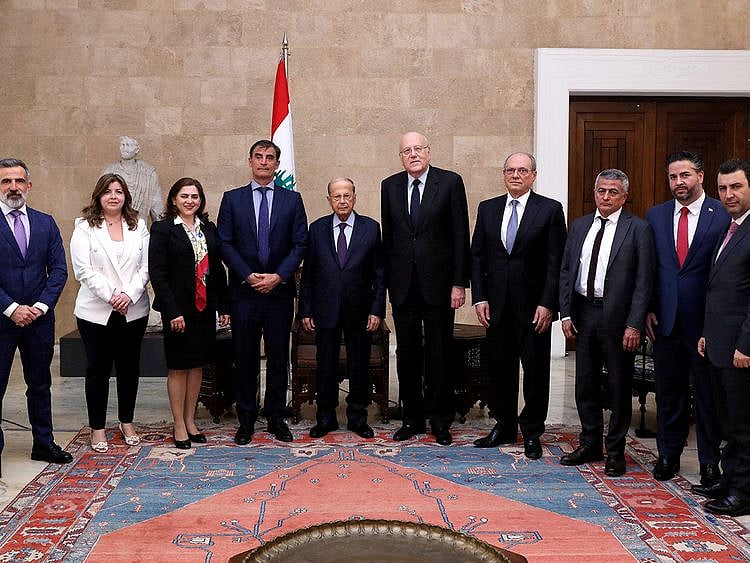New Lebanese parliament will act on IMF deal, PM adviser says
Move by Gulf countries reflects worry of state collapse, analyst says

Beirut: A set of reforms the IMF wants Lebanon to enact before approving a funding deal for the country will largely be left for a new parliament to study, an adviser to the prime minister said on Friday, suggesting little may be done before a May 15 national election.
The IMF announced the draft funding deal on Thursday, but said its board would not decide on whether to approve it until Beirut enacts a batch of reforms including measures which ruling factions have long failed to deliver.
An IMF agreement is widely seen as the only way for Lebanon to start emerging from what the World Bank has described as one of the world’s worst ever financial collapses — and the deepest crisis since Lebanon’s 1975-90 civil war.
Many analysts have expressed renewed doubt that Lebanon’s fractious parties can deliver reforms they have long been unwilling or unable to agree, even as Lebanese leaders have hailed the IMF deal and vowed to make it succeed.
The parliamentary election is seen as another complicating factor. After the vote, a new government must be agreed — a process that usually takes many months.
Nicolas Nahhas, a senior lawmaker and adviser to Prime Minister Najib Mikati, noted there were only a few weeks left before the election and MPs were busy campaigning.
“This wasnt meant to be done in a few weeks and nobody serious would say it should be done in that time frame,” he said of the reforms, adding that parliament could possibly approve a capital control law and budget law before the vote.
Benchmark
“The agreement is a kind of benchmark of what should come after elections. So, after elections, parliament will start studying quickly these actions and then we shall see how we go forward.”
Before the agreement goes to the IMF board, the Fund said the authorities had agreed to complete measures including cabinet approval of a bank restructuring that recognises and addresses large losses in the sector, while protecting small depositors and limiting their recourse to public resources.
Lebanon’s political and financial elite have been at odds over such a plan for two years, particularly the issue of how to distribute some $70 billion of losses between banks, the state, and depositors.
Central bank chief Riad Salameh told Reuters he hoped the IMF terms would be met, that the central bank had “cooperated and facilitated” the IMF mission and that the deal would “contribute to the unification of the exchange rate.”
State collapse
Goldman Sachs said the reforms were economically and politically challenging, “but none more so in our view than the restructuring of the local banks”.
“The distribution of losses between the government, bank shareholders and depositors is a politically challenging question and is unlikely to be resolved easily (or quickly), in our view,” it said in a note.
The deal was a “significant step forwards”, but more of a carrot “than a promise of near-term financial assistance”.
Mike Azar, an expert on Lebanon’s financial crisis, said the deal lacked details, including any solutions, and would be sold to voters as a “victory when in reality its a non-binding statement of intentions accompanied by nothing tangible”.
“It is unfortunate that the IMF agreed to hand the government a hollow victory just ahead of elections.” Donors want Beirut to address the root causes of the crisis, including state waste and corruption, before releasing aid.
The United States welcomed the deal, urging Beirut to enact reforms. France called it “an important first step”.
Kuwait and Saudi Arabia, once a major donor to Lebanon, on Thursday said their envoys would return to Beirut, marking a thaw in ties that have been strained by the influence wielded in Beirut by the Iran-backed Hezbollah.
Speaking after a meeting with President Michel Aoun, Patriarch Bechara Boutros Al-Rai linked the IMF deal to the return of the Gulf envoys, saying the steps “complete each other”.
“This all feeds into the same place because they always said they would stand with Lebanon,” he said.
Andrew Tabler, a fellow at the Washington Institute for Near East Policy, said the two developments reflected the same thing: “Concern about a Lebanese state collapse is increasing in the West and in the region.”
“I am sceptical [Lebanese politicians] will take the hard choices. They usually don’t.”
Sign up for the Daily Briefing
Get the latest news and updates straight to your inbox
Network Links
GN StoreDownload our app
© Al Nisr Publishing LLC 2025. All rights reserved.